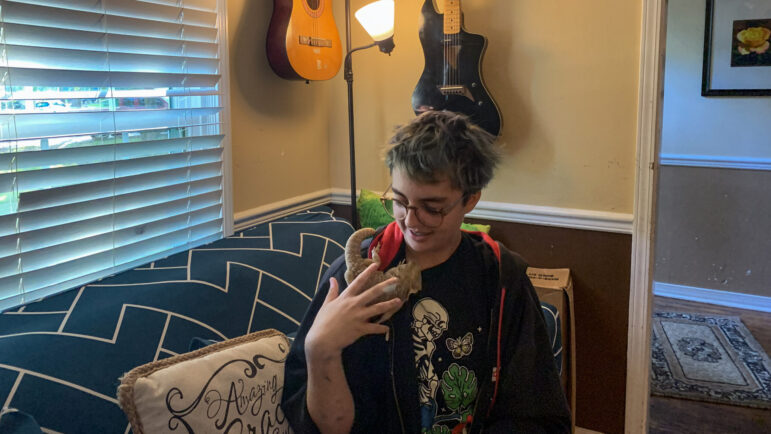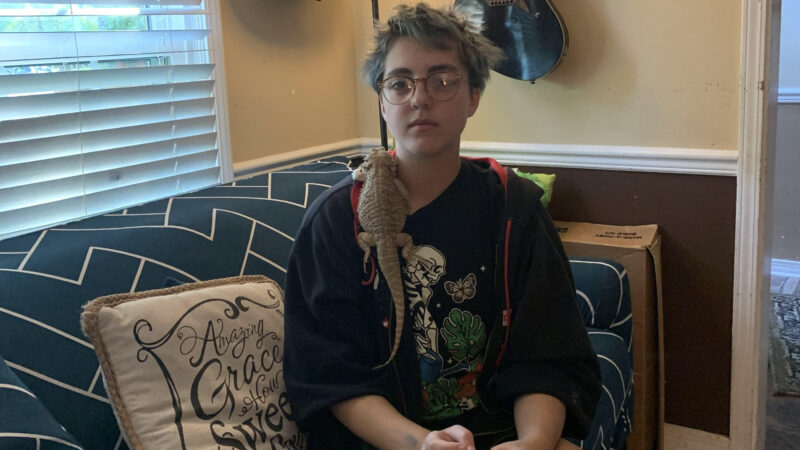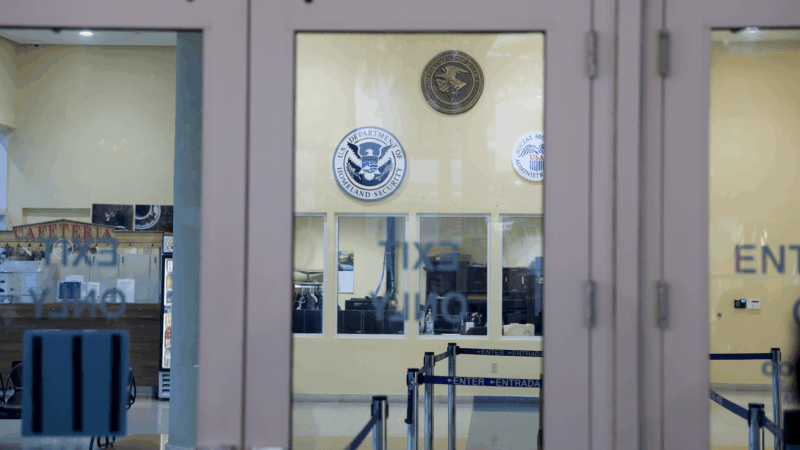‘Kids will end their lives’: Anti-trans legislation is impacting mental health in the Gulf South
Wyn Arenth sits and talks in his living room while his pet bearded dragon, Ace, looks on in Mandeville, Louisiana, on June 2, 2023. As a trans teenager, Wyn is the target of legislation and book bans.
Content Warning: This story mentions thoughts of self-harm and suicide among LGBTQ+ youth. It may not be safe for all readers. If you or someone you know may be considering suicide, contact the National Suicide Prevention Lifeline at 988 (Deaf and Hard of Hearing: 711 then 988) or the Crisis Text Line by texting 741741.
It’s a balmy Friday night on New Orleans’ north shore, in Mandeville, Louisiana — a small town just across Lake Pontchartrain. For the Arenth family, that means one thing: pizza night.
The whole family gathers in the kitchen, and Mom, Joanna, and Dad, Tony, try as best they can to direct the production line. They assign sauce, cheese, and topping duties to their three kids — with the promise of ice cream if the work is equitably shared.
The oldest son, 15-year-old Wyn, obliges his youngest brother, handing him the spoon and stepping aside to let him take over the sauce application station. His pet bearded dragon, Ace, looks on from where he’s perched on Wyn’s shoulder.

The whole scene is about as all-American as it gets. The kitchen is a cacophony of laughter and voices. The little kids quote lines from their favorite Disney movies. The teenager rolls his eyes when his siblings start singing the same song they’ve been singing every day for months.
“We’re big fans of that song from the new ‘Mario’ movie,” Tony Arenth says, referencing Jack Black’s “Peaches” from the recent blockbuster. “What’s it called?”
“Don’t even say it,” Wyn Arenth says, pleading. “We were visiting the hospital and the nurse was offering my grandfather some peaches, and my little brother went ‘Peaches!’ and immediately started singing the song.”
Annoying songs aside, Wyn said he loves his family. He feels safe and supported at home. But outside is a different story. Wyn is trans, and over the past year, kids like him have been the target of a mountain of legislation across the Gulf South — and the country.
So-called “Don’t Say Gay” bills, which prevent discussions about gender or sexual orientation in schools, were passed at the Louisiana legislature and signed into law in Alabama. In late May, a transgender girl in Mississippi missed her high school graduation after not being allowed to wear a dress under her cap and gown.
Lawmakers in Louisiana spent a lot of time this past legislative session on bills aimed at transgender youth. Bills that would keep Wyn from using his chosen name and pronouns at school, or seeking medical care that would affirm his gender identity, made it through the state’s house and senate before being sent to Louisiana Gov. John Bel Edwards’ desk. Edwards said it is his “expectation” that he will veto the bills during his end-of-session news conference.
On top of the legislative efforts, conservative groups in Louisiana — especially in Wyn’s home parish of St. Tammany — have been trying to get books banned from public libraries. Many of the challenged books contain trans characters and themes. Proponents say the goal of these efforts is to protect children, but medical experts say the intentional targeting of young trans people negatively impacts their mental well-being and could have devastating consequences.
Even when some of the anti-trans bills fail to gain enough votes in Louisiana, some legislators have worked to resurrect them after they were voted down. And there will likely be more bills in the future. There doesn’t appear to be any end in sight.
“It makes me sad to think that this is the kind of world that I’m going to have to grow up in,” Wyn said. “It makes me feel, just, down. Thinking that no matter how much I do, there is always going to be somebody else who is going to go against me and is going to see my entire existence as a threat.”
‘We haven’t done anything wrong to anybody’

For Wyn, he said book bans and laws aimed at people like himself and his friends make him feel like he’s under constant pressure. It’s taken a toll and really gets to him.
“I really just get confused. How could somebody forget that easily, that somebody who walks down the street, has a favorite cereal, but also has the label of trans, or gay, or lesbian, how could they just forget that somebody like that is a human being?” Wyn said. “We’re still living human beings. We haven’t done anything wrong to anybody. We’re just trying to get through the day and it’s just not fair.”
Wyn said he’s used to being bullied by other kids at school — he’s dealt with it all his life for being trans and says he’s developed a “tough skin.” But it’s not just kids at school anymore. With lawmakers and parents joining in, the pressure is becoming unbearable.
“I put up some fliers for a rally and it got put on Facebook, and people in the comments wasted no time directly talking about me and calling me slurs — people’s parents,” Wyn said. “Why is this something that I have to put up with? No 15-year-old child should have to deal with being bullied and harassed almost every day.”
Mental health experts say this increase in anti-trans rhetoric and legislation is taking a toll, and the data shows it. About 40% of young LGBTQ people in the U.S. reported seriously considering suicide, according to a report from the Trevor Project. In the South, that number is even higher.
“For young trans people, there is a sense of anxiety. For some people, it shows up as depression or despair. For others, it may show up as outrage. And then for some, it may go into numbness,” Dr. Thema Bryant, president of the American Psychological Association, said. “After a while, you can just emotionally shut down and disconnect from yourself. Overall, there is a sense of not feeling safe and a lack of security that things are constantly changing in terms of reversing rights, or even presence or visibility.”
‘You have some people who are for you’
Bryant said that when mental health experts look at harassment and other forms of trauma, one of the largest predictors of resiliency or recovery is the response an individual receives.
“If one person says something mean-spirited but everyone rallies around you, then your outcome is a lot better,” Bryant said. “In this case, it’s not just one person saying something against you, but you have legislators, you have people who are in power who are making speeches and organizing against you. That really can be devastating emotionally.”
Young transgender people in the South are a vulnerable population right now, Bryant said, and one of the “protective factors” for their mental health is social support.
“All of us will have challenges in our lives, and if you have a marginalized identity, then you have additional barriers,” Bryant said. “One of the pieces that helps to protect your mental health, that we would say is a buffer against the depression or suicidal thoughts, is the sense that you have some people who are for you.”
For Wyn, one of those social support systems is the Gay-Straight Alliance, or GSA, at his high school. It’s basically a club for queer kids and their allies.
Wyn said outside of his home, that’s where he feels most comfortable and accepted. He and his friends get together in their French teachers’ classroom, have snacks, talk about the latest news (or gossip) and just hang out.
“It’s just little things like that give people such a sense of normal community and then having to step out and then see everything else. It’s just like, what happened?” Arenth said. “So having clubs like our GSA, it’s so important.”
Clubs like GSAs are organized and led by a “sponsor,” which is usually a teacher at the school who volunteers to monitor and supervise the room during their off hours.
Some of these teachers say this is the only time that many of these kids feel safe just being themselves.
“For my kids, my trans students, most of them were uncomfortable even expressing to a teacher that they had a preferred name,” Mel Manuel, a teacher who ran a GSA at a Baton Rouge school, said. “So typically, they would only use their preferred name in GSA.”
Manuel, who identifies as non-binary, recently left teaching to focus on their campaign for Louisiana’s first congressional district in the 2024 election.

Manuel said they’ve seen how much of a difference safe spaces like GSAs can make for young LGBTQ+ people, and they’re worried that these organizations are under threat. Manuel thinks laws like the so-called “Don’t Say Gay” bills passed in the region could make them illegal and have deadly consequences.
“I had a student at GSA who wrote a letter to the governor recently about this legislation, and they talked about how they thought about doing harm to themselves or even committing suicide,” Manuel said. “That’s definitely something that I heard a lot in GSA. I don’t want to sound hyperbolic, but some kids will end their lives over this kind of legislation.”
‘We really have to stand in the gap’
Medical experts like Bryant don’t think it’s hyperbolic, either. Bryant said that given the high rates of self-harming behaviors and suicidality young transgender people face, to take away the social support is an “attack on people’s very lives.”
Bryant said it makes “all the difference in the world” when people, especially young people, feel seen, heard, understood, and appreciated. She said trans kids, like Wyn, need to not just be tolerated, but celebrated and supported.
“It is not an exaggeration to say taking away someone’s support system, especially a person with a marginalized identity, puts someone at risk. At risk of harm by themselves, but also at risk of harm from others,” Bryant said. “And so we really have to stand in the gap.”

Wyn is grateful that his family and friends support him. They always have. And their love and support make him want to help others who may feel isolated or depressed.
It inspired him to share the acceptance he’s experienced. He organized a Pride picnic at a nearby park in his hometown — one that everyone was welcome to join.
“I want that to not be a protest, but more of a celebration of ‘Look at what we’ve done so far. Look at all the people who have continued to fight,’” Wyn said. “And as long as you’re breathing, you’re fighting without even knowing it.”
This story was produced by the Gulf States Newsroom, a collaboration between Mississippi Public Broadcasting, WBHM in Alabama, WWNO and WRKF in Louisiana and NPR. Support for health equity coverage comes from The Commonwealth Fund.
Trump to raise global tariffs. And, most say the state of the union is weak, poll says
President Trump says he is raising global tariffs to 15%. And ahead of the president's address tomorrow, most Americans say the state of the union is not strong, according to an NPR poll.
U.S. has a quarter fewer immigration judges than it did a year ago. Here’s why
The continued drain of personnel from the already strained immigration court system has contributed to depleted staff morale, mounting case backlogs — and floundering due process.
Poll: Most say the state of the union is not strong and the U.S. is worse off
Ahead of the State of the Union address on Tuesday, evidence continues to mount that President Trump is facing political headwinds.
The owners want to close this Colorado coal plant. The Trump administration says no
The Trump administration has ordered several coal plants to keep operating past their planned retirement, part of a larger effort to boost the coal industry. Two Colorado utilities are pushing back.
Influencers are promoting peptides for better health. What’s the science say?
The latest wellness craze involves injecting these molecules for athletic performance, longevity and more. Scientists say the research isn't keeping pace with the health claims.
Mexico fears more violence after army kills leader of powerful Jalisco cartel
School was canceled in several Mexican states and local and foreign governments alike warned their citizens to stay inside following the army's killing of the leader of the Jalisco New Generation Cartel, Nemesio Rubén Oseguera Cervantes, "El Mencho," and the violence it spurred







